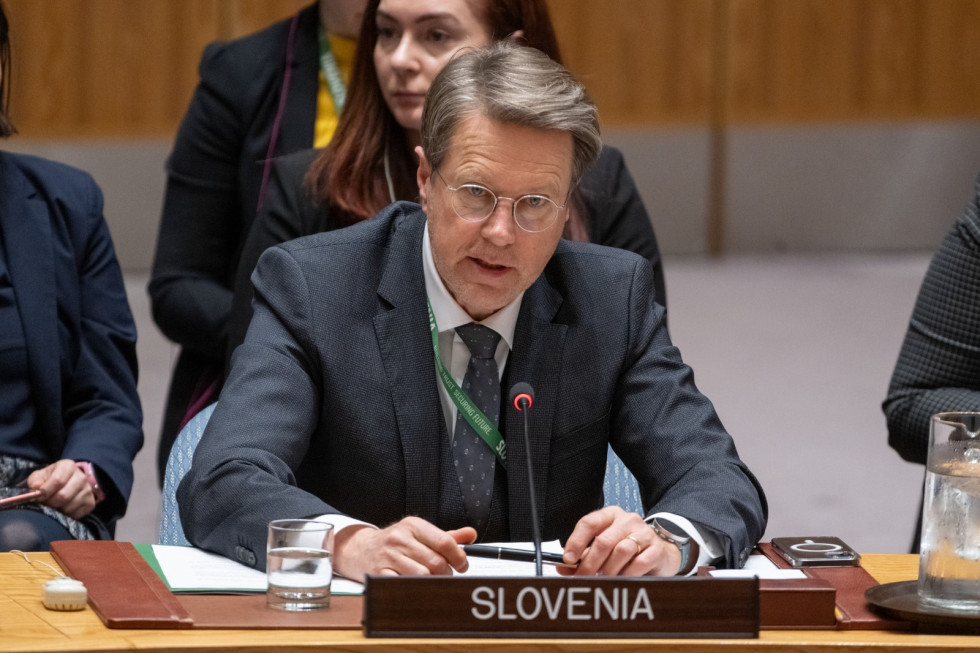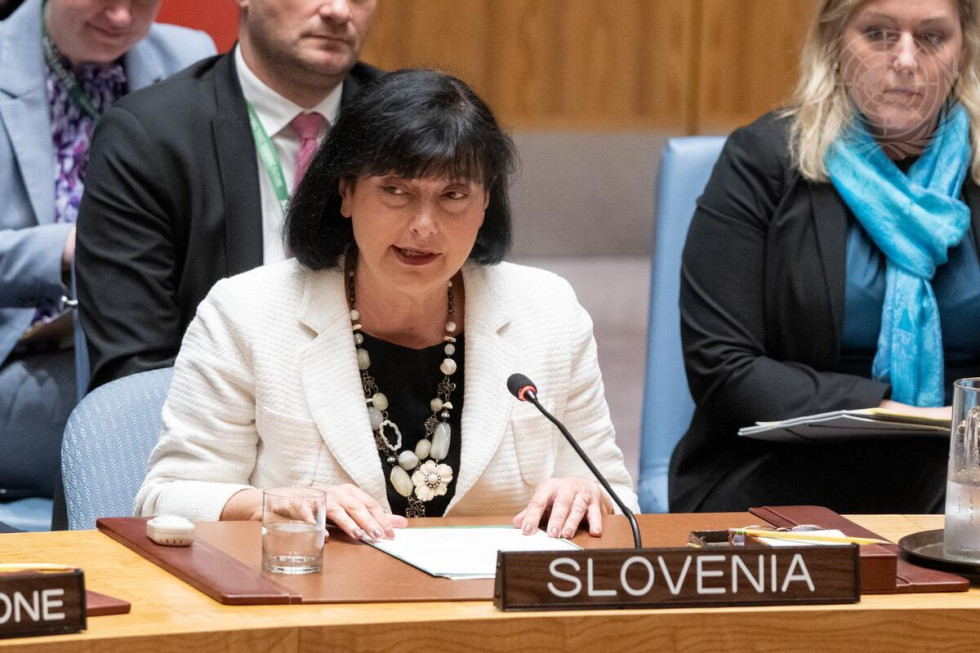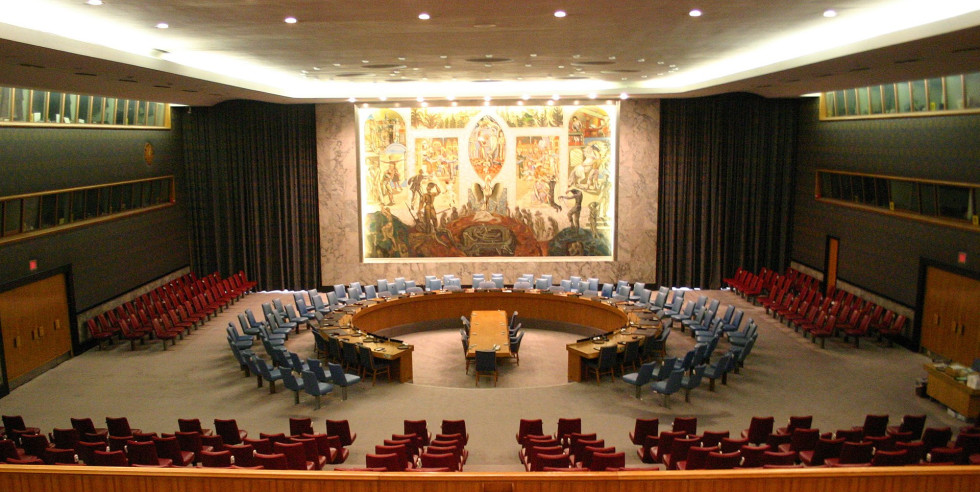Highlights of Slovenia's work in UN Security Council in April 2024
On 18 April, the UN Security Council voted on an Algerian-sponsored resolution recommending that the 193-member General Assembly grant Palestine full UN membership. In the long term, a two-state solution in which Israelis and Palestinians live peacefully side by side is the only viable option.
In the first week of April, Slovenia, together with Algeria, Guyana and Switzerland, called for a meeting of the Security Council following the attack on humanitarian workers and the continuation of fighting in Gaza without a ceasefire. It condemned the attacks on humanitarian, medical and UN personnel in Gaza and called for an investigation into who was responsible. In his speech, Ambassador Žbogar stressed the importance of the full, safe, secure and unhindered delivery of humanitarian aid, adding that if aid is to reach the people, humanitarian workers must be allowed to carry out their mission without constant fear.
Following the attack on the Iranian consulate in Damascus and Iran's attack on Israel, the Security Council held two emergency meetings to address both events, including in light of the growing and serious risk of escalation in the wider Middle East. The Council also discussed the crucial role and mandate of the United Nations Relief and Works Agency for Palestine Refugees (UNRWA), which is facing great difficulties in providing humanitarian assistance to the civilian population in Gaza. Slovenia expressed its strong political and financial support for the work of UNRWA and condemned all attacks on its premises. In the open debate on the Middle East, including the Palestinian question, the Secretary-General, Ambassador Renata Cvelbar Bek, recalled the responsibility of all Security Council members for the maintenance of international peace and security, which we should assume with a clear dedication to end this conflict, with a commitment to the United Nations Charter and to international law.
Ukraine was on the Security Council's agenda four times this month. In a briefing on the humanitarian situation in Ukraine, Slovenia underlined Ukraine's right to self-defence and stressed that violations of international law, civilian suffering and aggression must stop. In this context, attacks on critical civilian infrastructure were highlighted. In a briefing held at the request of Slovenia and the US on the attack on the Zaporizhzhia nuclear power plant, Slovenia warned of the looming dangers since Russia's initial attack and control of the plant in March 2022. Ensuring and maintaining nuclear safety is crucial.
The debate on the UN Secretary-General's report on the United Nations Interim Administration Mission in Kosovo (UNMIK) once again exposed the deep wounds and divisions between the two communities in Kosovo. Slovenia recalled the progress achieved over the past 25 years and stressed that the way forward should be based on dialogue, implementation of agreements, ensuring security and prosperity for all citizens of Kosovo, and on acceptance and coexistence.
There was also a briefing on the situation in Bosnia and Herzegovina, which Slovenia considered to be exploited for geopolitical purposes, and called on the Security Council to refrain from engaging in unnecessary and misleading debates driven by individual domestic political interests. Instead, Slovenia emphasised the importance of respecting and supporting international instruments and mechanisms. Furthermore, it advocated for support for Bosnia and Herzegovina as it progresses towards EU membership, which would ensure peace and long-term stability for the country.
During the open debate on the role of young people in addressing security challenges in the Mediterranean, Secretary-General Renata Cvelbar Bek said that the future belongs to young people and they must have a voice in shaping it. To give our youth a future free from war and fear, we must act now to build a more peaceful, sustainable and prosperous future, both in the Mediterranean and beyond.
The Security Council convened a debate on children and armed conflict to discuss the denial of humanitarian access, which the Security Council has identified as one of the six grave violations against children in times of war. Slovenia expressed its outrage at the continued denial of humanitarian access, stressing that rules apply even in war. Parties to the conflict must respect their obligations under international humanitarian law and international human rights law.
At the annual Open Debate on Women, Peace and Security, which focused on the prevention of conflict-related sexual violence through demilitarisation and gender-responsive arms control as the central theme, Slovenia strongly condemned all forms of sexual and gender-based violence. The Women, Peace and Security agenda is also one of Slovenia's priorities in the Security Council.
Slovenia voted in favour of the resolution on the non-proliferation in outer space and participated in the negotiations on ensuring a safe space environment and the peaceful use of outer space.
The crisis in Myanmar necessitated another Security Council meeting on the issue after five years. In this context, Slovenia drew attention to the continuing deterioration of the humanitarian situation in the country and condemned the indiscriminate violence by the army against the civilian population. The Security Council also discussed the situation in Haiti, where Slovenia condemned the widespread and coordinated gang attacks, pointed to the seriousness of the humanitarian crisis and the political instability, and expressed its continued support for the Haitian people.
The Security Council also addressed the deteriorating security and humanitarian situation in the African Great Lakes region and twice discussed the situation in Sudan, where one year of war has unleashed the world's worst displacement and food insecurity crisis. Slovenia has consistently called on all parties in Sudan to end the violence and renew efforts to reach a durable ceasefire and political settlement, to prevent interference by external actors, to protect civilians, in particular vulnerable groups, and to ensure unhindered humanitarian access. The Security Council also extended the mandate of the United Nations Mission in South Sudan (UNMISS) for one year. UNMISS plays a crucial role in fostering enduring peace in the world's youngest country and supporting inclusive and accountable governance, as well as facilitating preparations for free, fair and peaceful elections.



